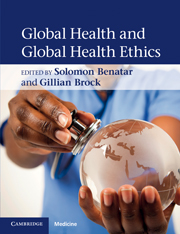Book contents
- Frontmatter
- Contents
- List of contributors
- Introduction
- Section 1 Global health, definitions and descriptions
- Section 2 Global health ethics, responsibilities and justice: some central issues
- Section 3 Analyzing some reasons for poor health
- Section 4 Shaping the future
- 20 The Health Impact Fund: how to make new medicines accessible to all
- 21 Biotechnology and global health
- 22 Food security and global health
- 23 International taxation
- 24 Global health research: changing the agenda
- 25 Justice and research in developing countries
- 26 Values in global health governance
- 27 Poverty, distance and two dimensions of ethics
- 28 Teaching global health ethics
- 29 Towards a new common sense: the need for new paradigms of global health
- Index
- References
20 - The Health Impact Fund: how to make new medicines accessible to all
Published online by Cambridge University Press: 01 March 2011
- Frontmatter
- Contents
- List of contributors
- Introduction
- Section 1 Global health, definitions and descriptions
- Section 2 Global health ethics, responsibilities and justice: some central issues
- Section 3 Analyzing some reasons for poor health
- Section 4 Shaping the future
- 20 The Health Impact Fund: how to make new medicines accessible to all
- 21 Biotechnology and global health
- 22 Food security and global health
- 23 International taxation
- 24 Global health research: changing the agenda
- 25 Justice and research in developing countries
- 26 Values in global health governance
- 27 Poverty, distance and two dimensions of ethics
- 28 Teaching global health ethics
- 29 Towards a new common sense: the need for new paradigms of global health
- Index
- References
Summary
Introduction: severe poverty persists on a massive scale and could be greatly reduced at low cost
Many more people – some 360 million – have died from hunger and remediable diseases in peacetime in the 20 years since the end of the cold war than have perished from wars, civil wars, and government repression over the entire twentieth century. And poverty continues unabated, as the official statistics amply confirm: 1020 million human beings are chronically undernourished (FAO, 2009), 884 million lack access to safe water (WHO & UNICEF, 2008, p. 30), and 2500 million lack access to improved sanitation (WHO & UNICEF, 2008, p. 7), while 2000 million lack access to essential medicines (Fogarty Center for Advanced Study in the Health Sciences, n.d.), 924 million lack adequate shelter (UN-Habitat, 2003, p. vi) and 1600 million lack electricity (UN-Habitat, n.d.). About 774 million adults are illiterate (UNESCO, 2008) and 218 million children are child laborers (ILO, 2006, p. 6).
Roughly one-third of all human deaths, 18 million annually, are due to poverty-related causes, straightforwardly preventable through better nutrition, safe drinking water, cheap rehydration packs, vaccines, antibiotics and other medicines. People of color, females and the very young are heavily over-represented among the global poor, and hence also among those suffering the staggering effects of severe poverty. Children under 5 account for half, or 8.8 million, of the annual death toll from poverty-related causes (UNICEF, 2009). The over-representation of females is clearly documented (UNDP, 2003, pp. 310–330).
- Type
- Chapter
- Information
- Global Health and Global Health Ethics , pp. 241 - 250Publisher: Cambridge University PressPrint publication year: 2011
References
- 4
- Cited by

